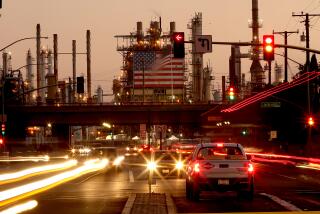Livestock farmers raise stink over EPA report
- Share via
MONTGOMERY, ALA. — For farmers, this stinks: Belching and gaseous cows and hogs could start costing them money if the federal government decides to charge fees for air-polluting animals.
Farmers are turning their noses up at the notion, which they contend is a possible consequence of an Environmental Protection Agency report after the U.S. Supreme Court ruled in 2007 that greenhouse gases from motor vehicles amount to air pollution.
“This is one of the most ridiculous things the federal government has tried to do,” said Alabama Agriculture & Industries Commissioner Ron Sparks.
EPA officials insisted Friday that the report, which mostly focuses on other sources of air pollution, does not include a proposal to tax livestock.
But the American Farm Bureau Federation said, based on federal agriculture department figures, it would require farms or ranches with more than 25 dairy cows, 50 beef cattle or 200 hogs to pay an annual fee of about $175 for each dairy cow, $87.50 per head of beef cattle and $20 for each hog.
The executive vice president of Wyoming Farm Bureau Federation, Ken Hamilton, estimated the fee would cost owners of a modest-size cattle ranch $30,000 to $40,000 a year. He said he has talked to a number of livestock owners about the proposals, and “all have said if the fees were carried out, it would bankrupt them.”
Farm groups say the fee would apply to farms with livestock operations that emit more than 100 tons of carbon emissions in a year and fall under federal Clean Air Act provisions.
EPA officials said the agency hasn’t taken a position on any of the matters discussed in its response to the Supreme Court ruling. John Millett, spokesman for EPA’s air and radiation division, said the EPA report was oversimplified “to the point of distortion.”
“EPA is not proposing any type of tax on livestock,” he said.
Farmers have expressed outrage over the EPA report, both on Internet sites and in opinions sent to EPA during a public comment period that ended last week. “It’s something that really has a very big potential adverse impact for the livestock industry,” said Rick Krause of the American Farm Bureau Federation.
More to Read
Sign up for Essential California
The most important California stories and recommendations in your inbox every morning.
You may occasionally receive promotional content from the Los Angeles Times.










